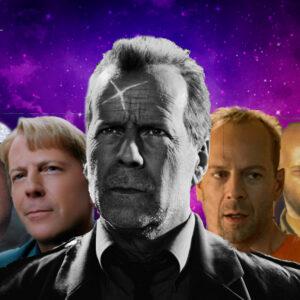Dakota Johnson, a name that has become synonymous with versatility and female empowerment in modern cinema, has firmly cemented herself as one of the most influential actresses of her generation. Known for her striking beauty, sharp intellect, and bold selection of roles, Johnson’s career trajectory has been far from conventional. From her breakout role in Fifty Shades of Grey to her more recent ventures in films such as The Peanut Butter Falcon and Cha Cha Real Smooth, Johnson has skillfully navigated Hollywood, challenging stereotypes and advocating for change both on-screen and behind the scenes.
While many actresses might be content to play the same type of role for the entirety of their careers, Johnson has sought out projects that resonate with her personal values—namely, the advancement of women and the deconstruction of outdated gender norms. As she continues to rise in prominence, Johnson has not only become an advocate for women in the industry but also an important figure in the broader conversation about gender equality. Her legacy, it seems, will be one defined not just by the roles she portrays, but by the causes she supports and the messages she shares with the world.
Challenging Stereotypes Through Diverse Roles
One of the most significant aspects of Dakota Johnson’s career is her commitment to challenging traditional portrayals of women in Hollywood. From the very start of her career, Johnson has chosen roles that force the audience to rethink what it means to be a woman in film.
Her most famous role, Fifty Shades of Grey (2015), catapulted her to international fame, though it also sparked considerable controversy. As Anastasia Steele, Johnson portrayed a character whose sexual desires and boundaries were central to the narrative—a departure from the typical portrayal of women as passive objects of male desire. Anastasia is not just a woman who falls in love with a man, but a woman who explores her own sexuality and assertiveness within a complex and often dark relationship. Although Fifty Shades of Grey is often seen as a divisive film, it undeniably presented an empowered, multi-dimensional woman who is not defined solely by her romantic entanglements. For Johnson, this role was not just about playing a character, but about pushing boundaries in terms of what mainstream audiences expect from women in film.
In How to Be Single (2016), Johnson took on a vastly different character: Alice, a young woman navigating the complexities of modern relationships and self-discovery in New York City. In stark contrast to the typical rom-com lead who is often defined by her pursuit of true love, Alice is a character who embraces independence, struggles with the pressures of societal expectations, and ultimately learns to be comfortable with herself without relying on a romantic partner. This role reinforced Johnson’s commitment to portraying women who are not simply defined by their relationships but who have full, independent lives of their own.
These roles, particularly in Fifty Shades of Grey and How to Be Single, highlight Johnson’s ability to portray complex, multifaceted female characters who challenge traditional gender norms. Her characters are not confined by the limitations often placed on women in film—whether it’s the trope of the damsel in distress, the self-sacrificing mother, or the superficial romantic lead. Instead, Johnson has chosen to portray women who are assertive, imperfect, and in control of their own destinies.
Promoting Gender Equality in Hollywood
Beyond her on-screen roles, Dakota Johnson has become an outspoken advocate for gender equality in Hollywood, using her platform to speak candidly about the challenges women face in the film industry. In interviews and public statements, Johnson has discussed the disparities between men and women in terms of pay, representation, and opportunities for creative control.
In 2017, during a Hollywood Reporter roundtable discussion, Johnson addressed the pay disparity between male and female actors, a topic that has been at the forefront of gender equality debates in the entertainment industry. She made it clear that the gender pay gap is not just a concern for women in front of the camera, but for those working behind the scenes as well. “I think it’s really important for us to talk about what we’re being paid,” Johnson stated, “because it’s not right that we don’t get paid the same amount as our male counterparts for doing the exact same work.”
Johnson’s advocacy for gender equality extends beyond the pay gap. She has also spoken out about the lack of female representation in the upper echelons of Hollywood, particularly in key decision-making positions such as directors, producers, and writers. In an interview with Variety, Johnson highlighted the systemic barriers that women face in securing these roles, stating that it’s crucial for the industry to change its practices in order to create a more inclusive and equitable environment for women. “We need more women behind the camera,” she said. “And we need more women making the decisions.”
By addressing these issues head-on, Johnson has contributed to an ongoing conversation that is reshaping Hollywood’s approach to gender equality. Her openness about the challenges women face, combined with her commitment to promoting change, makes her a valuable voice in the fight for equal rights within the entertainment industry.
Supporting Women Behind the Camera
Perhaps one of the most compelling aspects of Dakota Johnson’s career is her involvement in projects that give women a seat at the table behind the camera. Whether it’s through partnerships with female directors and producers or taking on roles that focus on female empowerment, Johnson has consistently supported the work of women in film.
One notable example is her role in The Peanut Butter Falcon (2019), a film in which Johnson starred alongside Shia LaBeouf. The film, which tells the story of a young man with Down syndrome pursuing his dream of becoming a professional wrestler, was directed by Tyler Nilson and Michael Schwartz, both of whom are men. However, the film also featured a number of women in key behind-the-scenes roles, including producers and writers, which Johnson was vocal about supporting. Her involvement in The Peanut Butter Falcon was more than just acting—it was about supporting a project that uplifted women in the industry and told a story of overcoming societal barriers.
Additionally, Johnson has worked with other female filmmakers, including Cha Cha Real Smooth (2022), a film directed by Cooper Raiff. Johnson not only played a significant role in the film but also served as a producer. Her work on Cha Cha Real Smooth further solidified her commitment to backing projects that prioritize women’s voices both in front of and behind the camera. By actively seeking out these types of projects, Johnson helps create a more inclusive Hollywood that empowers women at all levels of production.
Public Persona and Advocacy for Women’s Rights
In addition to her work on-screen, Dakota Johnson has used her public platform to advocate for women’s rights and gender equality in a variety of ways. Through social media, interviews, and public appearances, Johnson has consistently championed causes related to women’s empowerment, reproductive rights, and the fight against sexual harassment.
Johnson is vocal about her support for the #MeToo movement, which has exposed the prevalence of sexual harassment and assault in Hollywood. In a 2018 interview with Elle, Johnson opened up about her own experiences within the industry, acknowledging the challenges women face in navigating a male-dominated space. She has also been an advocate for reproductive rights, using her platform to speak out against restrictive abortion laws and in support of women’s autonomy over their bodies. As someone who is regularly in the public eye, Johnson’s advocacy carries significant weight, and she uses her visibility to shine a light on important social issues.
Through her public persona, Johnson has not only become an advocate for women’s rights but also a role model for young women everywhere. Her commitment to empowerment, equality, and social justice has made her a powerful force for change in the entertainment industry and beyond.
Conclusion – Dakota Johnson’s Legacy in Promoting Female Empowerment
Dakota Johnson’s career and advocacy work have left an indelible mark on the film industry. Through her carefully selected roles, her commitment to gender equality, and her support for women in all areas of filmmaking, Johnson has become a leading figure in the ongoing fight for gender equality in Hollywood.
What sets Johnson apart is not just her talent, but her ability to use her platform to inspire change. As an actress, she has consistently chosen roles that empower women, challenging traditional gender norms and pushing for more authentic and diverse representations of women on screen. As an advocate, she has spoken out about the challenges women face in the industry, from pay disparity to underrepresentation, and has worked tirelessly to create opportunities for women behind the camera.
In the years to come, Dakota Johnson’s legacy will undoubtedly continue to shape the conversation around gender equality in the film industry. Her work has proven that it is possible to be both a talented actress and a fierce advocate for change, making her not just a role model for women in film, but a powerful voice in the broader movement for women’s rights.





